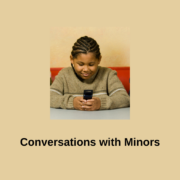Conversations with Minors
Young people are getting access to computers and phones at younger ages. They are also getting exposed to mature topics and content earlier in life. As a ministry, we see this as the number of conversations with young people is increasing and the topics becoming more complex.
We want to share Jesus and speak truth into all seekers, but we also have an obligation to adhere to the various rules and regulations that relate to conversations with Minors and privacy laws. For instance, in the U.S. there is the Children’s Online Privacy Protection Act (COPPA) that is a federal law prohibiting certain types of communication with children 13 years or younger. There are similar laws in Europe that apply to children under 16 years of age.
This has led us to remind volunteers that these conversations much be managed more sensitively and should always factor in the following reminders:
First Reminder – The ministry does not seek to collect any personally identifiable information from any seeker. So, in addition to avoiding full names and addresses, the ministry does not ask seekers their age. However, there are occasions when the seeker will volunteer such information, or you will be able to ascertain during the conversation. We coach volunteers to use common sense and their best judgement when speaking with someone that sounds like they are a Minor.
Second reminder – We recognize that conversations with Minors can be complex. As volunteers, we do not want to shy away from them, but we want to be conscious of who you are speaking to and what they are looking to discuss. Some volunteers may feel like walking with this young person over time as a mentor or coach would be helpful but this type of ongoing relationship is never allowed with a Minor.
Third reminder – As with all conversations, you should be evaluating the details the seeker shares. We do not ask volunteers to determine each seekers age. We encourage them to simply evaluate the information presented. If words like school, my teacher, kids, my parents, and other phrases that are not commonly used by adults are used then that would be a red flag. In these obvious cases, we always proceed cautiously determining what the guest is looking to discuss. We also want to determine whether they have someone they trust so we can encourage that connection. We always use discretion and avoid getting pulled into personal details that are not relevant to the conversation.
Once we suspect or realize that we are talking with someone under 18 years of age, we attempt to determine the type of conversation they are seeking and follow these guidelines for each type of conversation.
1. Spiritual Nature – Conversation purely spiritual in nature. These could be focused on questions about the Bible or concerning forgiveness, faith, how to be saved, or changing their relationship with God. These should be handled like any other legitimate conversation. Feel free to pray with them but also set boundaries and do not get pulled into an ongoing or repeated conversation.
2. General Life Discussion and Connection – Many young people come to the ministry just looking to talk or connect. They may bring up issues like friendships, school, loneliness, purpose, parents, identity, and feelings (anxiety, worry, depression). These should be handled directly with biblical direction. We want you to be intentional in leading this conversation to a positive close. Feel free to pray with them but also set boundaries and do not get pulled into an ongoing or repeated conversation.
3. Serious Life Issues – If the conversation relates to a serious life issue such as teen pregnancy, gender confusion, homosexuality, premarital sex, abuse, bullying, etc. then we want you to be intentional in leading this conversation to a positive close. This includes sharing biblical truth while at the same time encouraging the Minor to get help and speak to their parents, Youth Pastor, School Counselor or other trusted adult. Feel free to pray with them but also set boundaries and do not get pulled into an ongoing or repeated conversation.
4. Inappropriate Nature – As with any aged person, when the conversation is of an inappropriate nature, then we encourage you to graciously bow out and close the conversation quickly. Always show grace but be guarded with your words and encourage the minor to talk with their parents, Youth Pastor, School Counselor or other trusted adult.
We recognize it is hard to fit every possible conversation into one of four categories, but the reminders and guidelines above provide a safe framework for having conversations with Minors.

